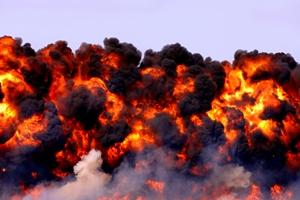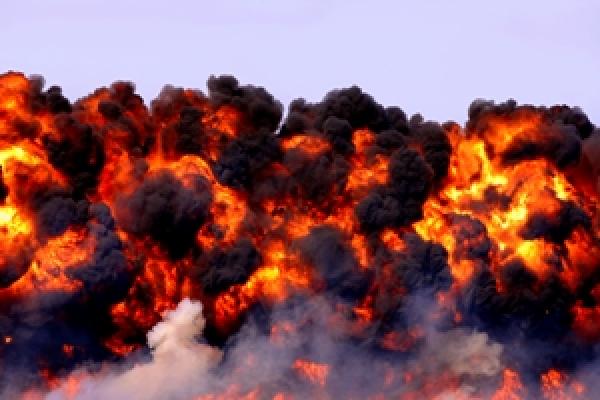
Steamship Mutual
Published: August 01, 2015

What happened?
Shortly after 11pm (local time) on 12 August 2015 firefighters arrived at Tianjin Port because a fire had been reported to have broken out in some containers.1 At about 11.30pm there was the first of two massive explosions, which caused significant loss of life and major property damage. What exactly happened and how the port has been affected remains at the time of writing unclear.
The blasts on the evening of 12 August apparently took place in a warehouse owned by Tianjin Dongjiang Port Rui Hai International Logistics Co. Ltd.2
The warehouse is said to have contained calcium carbide, potassium nitrate and ammonium nitrate. There have been unconfirmed reports that the warehouse contained 700 tonnes of sodium cyanide, stored in wooden boxes or iron barrels. Calcium carbide, when mixed with water, produces acetylene gas, which is flammable. A chemical safety expert has suggested that an acetylene explosion could have detonated the ammonium nitrate.3
Questions have been asked about whether such a large amount of sodium cyanide should have been stored in one place; and whether safe practices were followed in relation to how it was stored. Questions have also been raised over whether firefighters, who reportedly sprayed water on the initial fire before the blasts, followed the right protocol.4
There were reports of further fires and explosions on 15 August 2015.5
The extent of disruption to port activities remains unclear. Shipping lanes were initially closed. However, the warehouse was located outside the port area so damage to berths and internal port infrastructure is said to have been limited.6 On 17 August 2015 there were reports that some port operations were returning to normal.7 Oil terminals were reportedly closed due to safety concerns but seem, as at 17 August, to be reopening. There appear to be ongoing restrictions for vessels carrying dangerous goods and bunker oil. In light of the extent of the damage to the infrastructure supporting the port, for example roads and storage areas, the full impact of the disaster may not be seen for some time.
Laytime/demurrage issues
Where time is spent awaiting loading/discharge due to the Tianjin explosions, Members will need to consider the specific terms of charterparties to work out the financial consequences and whether these are for Owners’ or Charterers’ account.
As a matter of general principle, where a vessel is delayed from loading or discharging by the explosions, or by congestion following the explosions, Charterers are likely to have to pay demurrage under voyage charters, so long as the vessel is otherwise in all respects ready to commence operations. Owners will wish to ensure that they comply, insofar as possible, with all formal preconditions to time starting to run.
It is however quite common for voyage charters to provide that demurrage is payable at reduced levels, commonly one half, where demurrage arises out of or is incurred by reason of fire or explosion: see, for example, clause 15(2) of the Shellvoy 6 and clause 8 of the Asbatankvoy forms. Under such provisions, it seems likely that Charterers will be able to rely on such provisions to reduce demurrage payable. There may however be scope for arguments of fact about whether time has in fact been lost as a result of the explosions, or whether it was in fact lost as a result of precautions taken by port authorities in the aftermath of the explosions and/or by port congestion. Members should take care to retain evidence as to the cause of the delays experienced, for example any advice received from agents on the reasons for the waiting time.
Further, there is said to be a rule that "once on demurrage always on demurrage". That means that if a vessel was already on demurrage awaiting loading/discharge at Tianjin, the fact that the delays were exacerbated by the explosions may not mean that demurrage ceases to run or reduces to one half. The rationale for this rule is that had the Charterer performed its obligation to load/discharge within the laydays, the vessel would never have been on demurrage. Whether this principle applies to the wording of a particular exceptions clause needs to be considered with care.
Members should, as always, be alert to the need to document all relevant delays by notices of protest and statements of fact; and to the need to comply strictly with any notice provisions relating to when demurrage claims should be submitted, and what documents or evidence must be submitted to support those claims.
In relation to time charters, it is difficult to see how the explosions could have caused a vessel to go off-hire on standard charterparty wordings. Accordingly, Charterers are likely to be obliged to carry on paying hire for the period of any delays.
Safe port issues
The Courts have said that “a port will not be safe unless, in the relevant period of time, the particular ship can reach it, use it and return from it without, in the absence of some abnormal occurrence, being exposed to danger which cannot be avoided by good navigation and seamanship…”.9 On the facts summarised above showing that instructions to load/discharge at Tianjin amount to a breach of Charterers' obligations to nominate a safe port will not be straightforward. The obligation to nominate a safe port is a prospective one. That means that the issue of whether the port is safe is to be judged at the time the instructions were given.
To start with, it is unclear that the port is or has been unsafe. It has been reported that the relevant explosions did not seriously damage the port. There do not seem to have been significant reports of hazards at the port, such as gas, fires, or submerged objects propelled into the water by the explosion, although there have been reports that military chemical experts are testing the area.10
If under the particular charterparty the obligation to give instructions to proceed to a safe port is an absolute one, then it may be possible to argue that the storage of large amounts of sodium cyanide in the warehouse rendered the port unsafe. That will require further consideration of the facts if and when they become known. Even if that can be proven, however, Charterers may be able to argue that the explosions amounted to an unexpected and abnormal event, which is not inconsistent with a port being generally safe.11
However where, as in (for example) the Shelltime 4 form, the obligation to nominate a safe port is limited to the exercise of due diligence, on the facts as they presently appear it will be difficult to suggest that Charterers should have identified that the explosions were likely to occur.
It may also be difficult to show that the port was unsafe at the relevant time. Where a port was safe when nominated but becomes unsafe after the initial orders were given but prior to arrival, Charterers are generally obliged to cancel the original order and to issue fresh orders for a safe port. If they fail to do so, then it is generally thought that Owners may refuse to comply with the original order. However, that still raises the issue of whether or not the port has in fact been rendered unsafe by the explosions.
Finally, if explosions did render the port unsafe, then the port will probably be unsafe only on a temporary basis. The courts have held in the context of voyage charters that temporary factors making a port unsafe only amount to a breach of contract where there is inordinate delay so as to frustrate the adventure. The question of what amounts to "inordinate" delay is notoriously fact specific, but save in the case of perishable goods, if it is right that the port has now or is shortly to be reopened, it seems unlikely that any delay will be inordinate.
Frustration and force majeure
A voyage charter is only likely to be frustrated by delay where the delay is "inordinate". As mentioned above, unless the contract of carriage is for perishable goods when special considerations may arise, it is unlikely that such a contract could be said to have been frustrated by the delays that are likely in the event that the port quickly returns to full use.
Whether any force majeure provisions apply will need to be considered on a case by case basis as the wordings which apply can vary significantly.
Exceptions under the Hague-Visby Rules
It seems unlikely that cargo will have been damaged whilst onboard vessels by reason of the explosions, although there has undoubtedly been significant property damage onshore. If such damage has occurred, and insofar as the contract of carriage is governed by the Hague-Visby Rules, then Owners' liability for loss of or damage to goods may be excluded by Article IV rule 2(b) or (q).12
Exception (b), referring to loss or damage arising or resulting from fire, unless caused by the actual fault or privity of the carrier, is generally thought to extend to explosions resulting from combustion. Exception (q) is the general exception for loss or damage arising or resulting from any other cause arising without the actual fault or privity of the carrier, so even if the explosions fall outside the "fire" exception, they should be caught by this exception.
Other issues
Other issues are likely to arise, for example in relation to fixtures lost by reason of delays, disputes on specifically negotiated slot charters and in relation to container losses. They will all require careful investigation by reference to the terms of the specific contract of carriage. As always, before taking steps which may have significant consequences, legal advice should be obtained.
We are grateful to James Leabeater, Barrister at 4 Pump Court, for this article.
1 http://news.xinhuanet.com/english/2015-08/13/c_134513116.htm
2 http://news.xinhuanet.com/english/2015-08/13/c_134510491.htm
3 http://www.bbc.co.uk/news/world-asia-china-33923478
4http://www.bbc.co.uk/news/world-asia-china-33923478
5http://www.theguardian.com/world/2015/aug/15/tianjin-blasts-police-order-mass-evacuations-amid-further-explosions
6http://www.tradewindsnews.com/casualties/366760/tianjin-re-opens
7http://news.xinhuanet.com/english/2015-08/17/c_134525348.htm
http://www.reuters.com/article/2015/08/17/china-blast-port-idUSL5N10S01Z20150817.
9Leeds Shipping v Société Française Bunge (The Eastern City) [1958] 2 Lloyd’s Rep 127, 131.
Danger to the crew can also probably render a port unsafe.
10 http://www.bbc.co.uk/news/world-asia-china-33924501
11The Evia (No. 2) [1982] 2 Lloyd's Rep 307.
12The resolution of such issues may of course depend on the jurisdiction in which any claim is commenced.


